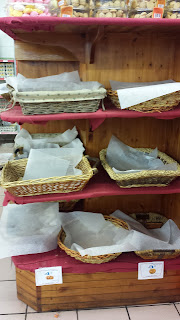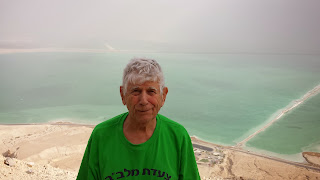There is a wonderful Hebrew expression: telefon shavour (broken phone). It means some kind of mis-communication. There was something of a telefon shavour about a washer/dryer in this apartment. You would think it's a yes or no; either there is or there isn't. But nothing is that simple. According to my emails with the management company that handles this apartment, yes, there is. According to the landlord, no there isn't. And indeed it would be hard to hide appliances of that size in this space, and when you look you can't find any. But even that's not quite right. On the phone the landlord said there's no w/d. He also apparently forgot (or maybe he never agreed in the first place) about the toaster oven he was supposed to provide. I said I have emails confirming both and would be happy to forward them to him. He said he would look into it. When the landlord came here to meet us a few days after we arrived, he did bring a toaster oven. A very nice toaster oven that I can actually use for cooking (and plan to make our Thanksgiving turkey in it). Then I said we need to settle the issue of the washer/dryer. He tried to get me to agree to use the laundry across the street. I don't mind doing that for linens and towels, but I have issues with strangers doing my underwear. So it turns out there is a washer/dryer in the basement store room (which is almost as large as the apartment) and he would make an exception and let us use it. This to me was more important than the oven. The first 3 years I lived in Israel I did pretty much everything by hand. 40 years later I don't want to be doing the same thing, nor do I want to spend $20 every time I need my clothes washed. When he showed me how to operate the machines he kept repeating that the washer wasn't so good and he didn't want to be held responsible if any clothes got ruined. I assured him that most of what we brought wasn't valuable enough to ruin, and the good clothes would go to a dry cleaner. He also reviewed the quirks of both machines, including pushing two 25 gallon drums of cement powder against the front of the washer because it migrates during the spin cycle. What he neglected to mention is how long it takes to do a load. We are used to high speed US washing machines that take half an hour. I know European machines take longer; even tho they are smaller capacity most of them take at least one hour. This one is particularly slow and inconsistent. The first time I did a load it took 3 hours. The second time was 2 hours. The third time was 3 hours. The dryer, which is a Bosch and has a sensor that automatically stops the machine when the clothes are dry, takes about 45 minutes.
The food in this country never ceases to amaze, as does the shopping experience. No matter how many supermarkets there are, nothing comes close to the Machane Yehuda shuk (produce market). The sights, smells and sounds are hard to capture. The merchants still try to drive customers to their stands with the same tattoos used by their fathers and grandfathers - beautiful tomatoes, citrus just delivered, grapes from the Golan, fresh Arava dates, the best halva in Israel, cucumbers 4 shekels (exchange rate at the moment is 3.5 shekels to the dollar) a kilo, pita just out of the oven, fish from the Sea of Galilee - if it was any fresher it would be swimming. Produce, bulk spices, dairy products, olives, pickles, breads and pastries, salads, meat, fish, chicken, housewares, even clothing are piled high and beautifully displayed. It's not always crowded and a smart shopper would go at the beginning of the week. But Israelis are obsessed with the idea of fresh, so most people do their shopping on Fridays when it's so crowded you can't move. The shuk has also become a place to go for dining and entertainment. The cafe chain Aroma opened a restaurant in the shuk a few years ago, which paved the way for a variety of restaurants and cafes. This trend hasn't seemed to impact the felafel stands which continue to do a brisk business.
The reason we are in Israel at this time is because of the bar mitzvah (in 3 parts) of our oldest Israeli grandson, Nir Argaman. Part One was this past Monday, when he was called to the Torah for the first time. The service was held in a small synagogue that was founded by his great-grandfather, not far from the shuk. We were told, variously, to be there at 730 or 800AM. The location information we were given was "behind the Mashbir Department Store" and "near the medical clinic". Not exactly exact. We had an address and google maps works very well here, but the street didn't appear on the map. We were able to get directions, but since the street name didn't appear on the map, all we had was arrows pointing to unidentified streets. We had enough of an idea, and like most unidentified places, everyone in the neighborhood knows where it is and is happy to give directions. We got close and were wandering around when someone in perfect English asked us if he could help us find something. We told him the name and address of the synagogue and he pointed to a narrow street and said go down there and take the first right. We did so, but unfortunately there was no street sign, none of the houses had numbers. We continued to wander aimlessly until Nir's father came out to find us. Someone told him a couple was wandering around the neighborhood and he figured it had to be us. I asked why there was no street sign. He said they haven't gotten around to putting one up, but everyone knows where the synagogue is.


Everything went off in typical Israeli fashion. It was somewhat chaotic, a little noisy, the 3 photographers were all over the place, the caterers brought the food in before the service was over, I got pelted with a piece of candy that would have put my eye out had it hit one inch lower, there was signing and clapping. Most important was Nir did well. He led part of the service and chanted part of the Torah reading. Everyone was pleased and proud.
Part Two was this morning - a shabbat service followed by lunch for about 30 people at Grandparents Eli and Batsheva Hasanov's house. This required a lot of preparation, and I spent Thursday cooking with Batsheva. She and Eli had done a lot of advance preparations, but certain things have to be made at the last minute (so they would be fresh). I had my sleeves rolled up and my cooking clothes on, and was ready to do whatever.
When Eli picked me up from the train station Thursday morning he gave me some bad news. One of their dearest and oldest friends had succumbed to cancer the day before. I knew him tangentially. This really put a damper on the upcoming celebrations, and the mood was subdued and the conversation more about the Big Questions than how much garlic to chop. At one point Batsheva said something about having to do some more shopping in the afternoon, but I didn't think there was any more to it than the shopping.
Around 2PM she said she was going to take a shower and get dressed. Again, I didn't think anything more of it it than she didn't want to smell like fried onions when we were shopping. When we left she said we had to pick up a couple of people. Again, I didn't think anything of it other than we were taking some people with us. As we collected the 3 other passengers and the talk turned to the deceased, I asked Batsheva where we were going and she said to the funeral. Telefon shavour.
This was my second funeral in Israel. The first one was when I lived here in the early 70's for a neighbor whose death raised some questions, which is a story for another time. Jewish law requires that a body be buried as soon as possible. In this country that can be as little as 3 hours, but mostly within 24. The reason it never dawned on me that the funeral hadn't yet taken place was because the death occurred Tuesday night so I assumed that when Eli picked me up on Thursday it had already occurred.
Funerals in Israel are fast, no frills and visceral. People show up in whatever clothes they happen to be wearing at the time, which means a lot of jeans and tee shirts.We gathered in a fairly large room (there were about 250 people) and it got pretty crowded. There was a lot of crying and wailing, and one of the mourners had a very loud near breakdown. The tallit-wrapped body was brought in on a stretcher and laid on a bier. 3 of his 12 grandchildren and 1 of his 5 children delivered eulogies. A few prayers followed and then it was time for the interment. Again, in typical Israeli fashion, the enormous Givat Shaul cemetery didn't have adequate parking so cars were parked on what should have been a traffic lane which resulted in a traffic jam lining up to drive to the burial site. Because this is such small country and land is so scarce part of the graves are built on stilts three stories high. The interment is quick. The grave is opened, the body placed inside, covered by bricks and the soil replaced. Because the depth is only about 3 feet, this process doesn't take much time. That left the concluding prayers and consoling the mourners one more time.
Then we went shopping.
The store we went to is relatively new, conveniently located near the cemetery. I hadn't seen anything like it before in Israel - a supermarket with wide aisles and large shopping carts. Everything came in large quantities, just like Costco. They even carried some Kirkland products. But in typical Israeli fashion, no thought was given to the amount of traffic the store would generate, so the access road is narrow and parking is inadequate, resulting in a perpetual traffic jam outside the building.
Then back to Batsheva's for more cooking. The 4 hour hiatus really set us back, and the mood was somber so we didn't get nearly as much done as we should have. We were more interested in talking about the Big Questions. The fact is, life does go on and we were preparing for an occasion that focuses on the future, not the past, the transition from childhood to adulthood, one of many junctions on the road that ultimately leads us to Givat Shaul. No matter how often we say it, the importance of celebrating and being thankful for the good times can't be said often enough.
This morning went off without a hitch. Nir read Torah, everyone was proud and happy. There was too much food and it was wonderful. We all had a great time being together and celebrating one of life's happiest occasions. I end this post with a brief conversation that put everything in perspective. I was holding our newest Israeli grandchild, who is 2 months old. I told his mom that when he is bar mitzvahed Sid will be 92. None of knows how much time we are allotted in this life. We need to number our days wisely.






































